Digestive Issues In Pets, Natural Pet Health, Worms In Pets
Worming your dog – is there a natural alternative?
Parasites worm their way into most dogs’ lives at one time or another and every responsible pooch parent has their dog on a regular deworming program to help keep them at bay. Just as worms can pose a danger to your cat, common parasites live in your dog’s intestinal tract and can make him or her very sick if left untreated.
Usually there are no obvious symptoms that your dog has worms, so out of sight should not mean out of mind as not only do they pose a danger to your dog, some worms can also infect humans and all of them can infect other dogs.
Here at HomeoPet, our mission is to provide a more natural way to help keep your pets healthy and although there are a range of chemical-based products available on the market today to treat worms, a drug free approach is possible, thanks to Host No More.
Host No More is easy to administer, is a safe and gentle natural chemical free product that works with the body’s own immune system.
But before we look at how Host No More can potentially benefit a dog with worms, we should have a basic understanding of the signs and consequences of worm infestation.
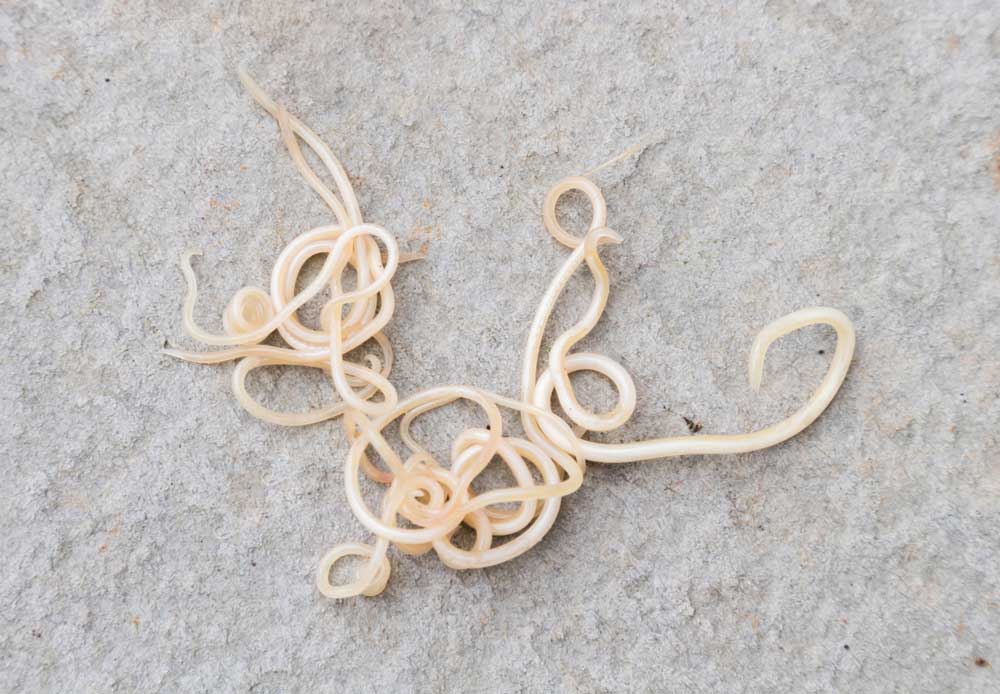 Canine roundworms look like strands of spaghetti and can reach up to 20cm in length! They live on partially digested food in the dog’s bowel, and adults release microscopic eggs that are passed out into the environment in the dog’s faeces. If a dog sniffs, licks, or plays in an area containing contaminated faeces the eggs can be picked up on his muzzle and paws and then ingested. Humans can also accidentally ingest roundworm eggs and become infected, so maintaining a clean environment is paramount in helping to prevent roundworm infestation for both you and your dog.
Canine roundworms look like strands of spaghetti and can reach up to 20cm in length! They live on partially digested food in the dog’s bowel, and adults release microscopic eggs that are passed out into the environment in the dog’s faeces. If a dog sniffs, licks, or plays in an area containing contaminated faeces the eggs can be picked up on his muzzle and paws and then ingested. Humans can also accidentally ingest roundworm eggs and become infected, so maintaining a clean environment is paramount in helping to prevent roundworm infestation for both you and your dog.
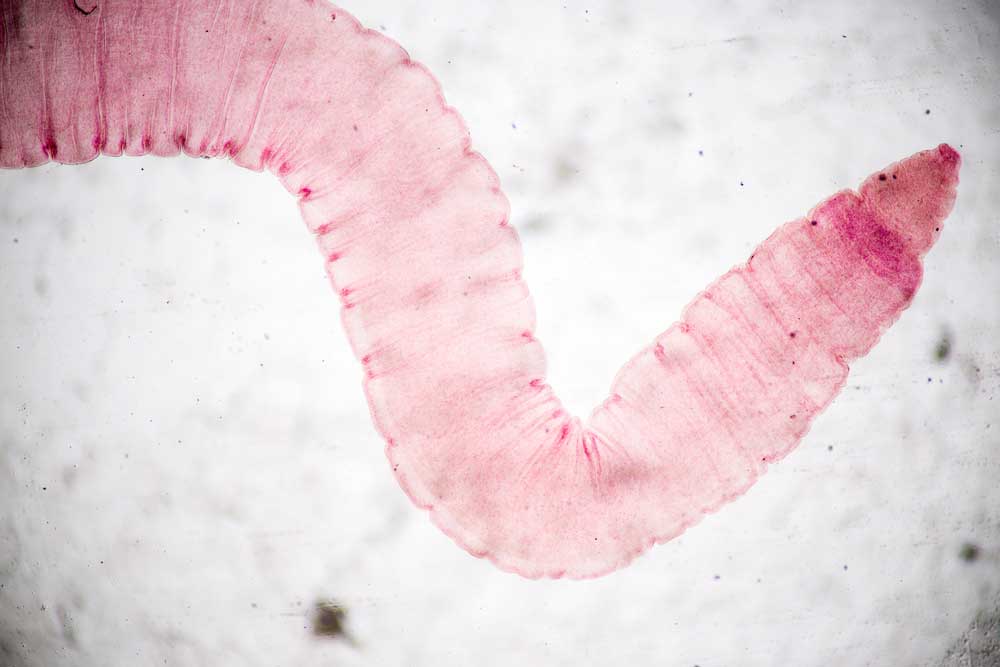 Tapeworms look like small pieces of rice and can be found in the faeces or around the tail and rear area. To complete their life-cycle, all tapeworms require an intermediate host to first eat the eggs from the environment and then your dog becomes infected by eating the intermediate host.
Fleas act as intermediate hosts for tapeworms, so your dog is easily infected by ingesting fleas as he grooms himself. Humans can also become infected through accidental ingestion of infected fleas, so it’s important to maintain a regular flea and worm treatment regime to help keep you and your dog safe and healthy.
Tapeworms look like small pieces of rice and can be found in the faeces or around the tail and rear area. To complete their life-cycle, all tapeworms require an intermediate host to first eat the eggs from the environment and then your dog becomes infected by eating the intermediate host.
Fleas act as intermediate hosts for tapeworms, so your dog is easily infected by ingesting fleas as he grooms himself. Humans can also become infected through accidental ingestion of infected fleas, so it’s important to maintain a regular flea and worm treatment regime to help keep you and your dog safe and healthy.
 Whipworms look like tiny pieces of thread, with one end enlarged, and live and lay eggs in your dog’s intestine which are then passed out in faeces, though they cannot be commonly seen with the unaided eye. They then spend about two weeks on ground developing into infective embryos before being ingested by your dog once again and so continuing on their lifecycle. Whipworms are able to live in an environment anywhere from a few months to a few years and their eggs can be present in soil, food, and water, as well as in faeces and animal flesh, consequently animals are generally infected due to poor hygiene.
Whipworms look like tiny pieces of thread, with one end enlarged, and live and lay eggs in your dog’s intestine which are then passed out in faeces, though they cannot be commonly seen with the unaided eye. They then spend about two weeks on ground developing into infective embryos before being ingested by your dog once again and so continuing on their lifecycle. Whipworms are able to live in an environment anywhere from a few months to a few years and their eggs can be present in soil, food, and water, as well as in faeces and animal flesh, consequently animals are generally infected due to poor hygiene.
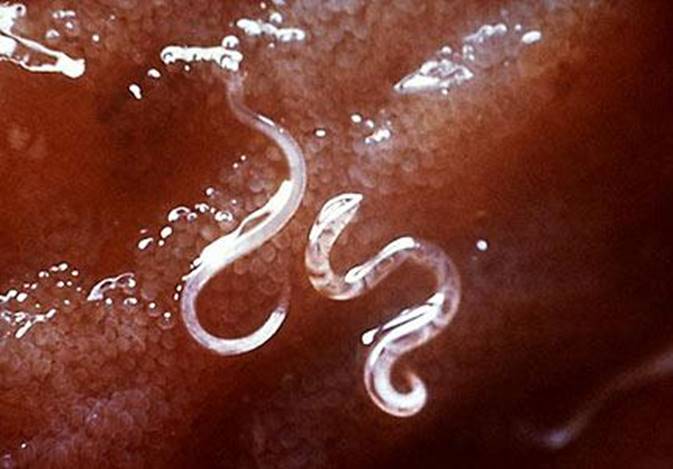 Similar to Whipworms, the very small size of Hookworms makes them very difficult to see with the unaided eye, but 500 worms can remove half 2Kg /4lbs of a puppy’s blood volume in a day, so they can inflict enormous damage! Hookworms can infect pups via milk and all dogs may be infected by ingesting eggs from their environment, from eating an infected intermediate host or by the larvae in the environment burrowing through the dog’s skin, which will cause a lot of itching. Hookworm larvae can also be picked up by humans if walking barefoot on affected sand or soil.
Similar to Whipworms, the very small size of Hookworms makes them very difficult to see with the unaided eye, but 500 worms can remove half 2Kg /4lbs of a puppy’s blood volume in a day, so they can inflict enormous damage! Hookworms can infect pups via milk and all dogs may be infected by ingesting eggs from their environment, from eating an infected intermediate host or by the larvae in the environment burrowing through the dog’s skin, which will cause a lot of itching. Hookworm larvae can also be picked up by humans if walking barefoot on affected sand or soil.
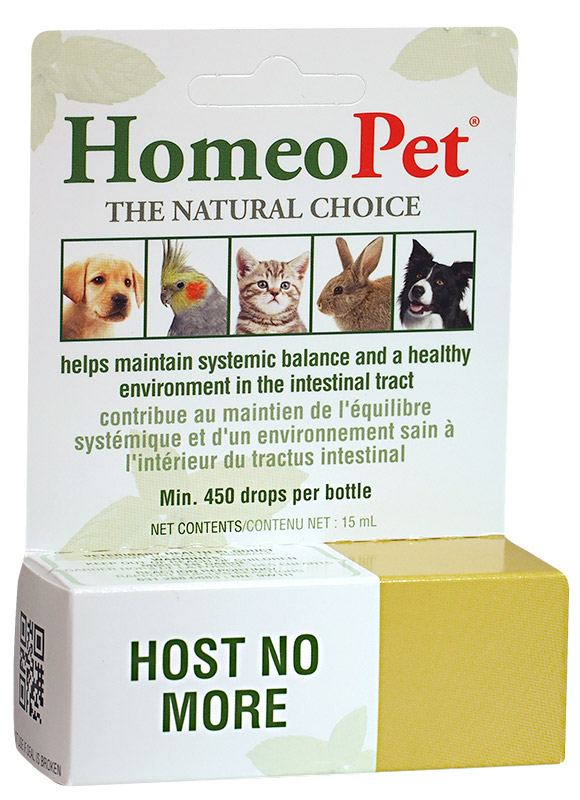 Worm types that are covered by Host No More include:
Worm types that are covered by Host No More include:
Does your dog have worms?
While the most obvious symptom that your dog is affected would be visible worms in his or her stool, this is not always the case. Other symptoms that your dog may display include rubbing his bottom on the ground, weight loss and being visibly underweight, worms in faeces, vomit, or around the anus, excessive hunger, flaky skin and a dull coat, diarrhoea or vomiting. If worms are left untreated for a long time, the effects can potentially be fatal – particularly for puppies, so you should always take veterinary advice before addressing the issue.Types of worms in dogs
Roundworm
 Canine roundworms look like strands of spaghetti and can reach up to 20cm in length! They live on partially digested food in the dog’s bowel, and adults release microscopic eggs that are passed out into the environment in the dog’s faeces. If a dog sniffs, licks, or plays in an area containing contaminated faeces the eggs can be picked up on his muzzle and paws and then ingested. Humans can also accidentally ingest roundworm eggs and become infected, so maintaining a clean environment is paramount in helping to prevent roundworm infestation for both you and your dog.
Canine roundworms look like strands of spaghetti and can reach up to 20cm in length! They live on partially digested food in the dog’s bowel, and adults release microscopic eggs that are passed out into the environment in the dog’s faeces. If a dog sniffs, licks, or plays in an area containing contaminated faeces the eggs can be picked up on his muzzle and paws and then ingested. Humans can also accidentally ingest roundworm eggs and become infected, so maintaining a clean environment is paramount in helping to prevent roundworm infestation for both you and your dog.
Tapeworm
 Tapeworms look like small pieces of rice and can be found in the faeces or around the tail and rear area. To complete their life-cycle, all tapeworms require an intermediate host to first eat the eggs from the environment and then your dog becomes infected by eating the intermediate host.
Fleas act as intermediate hosts for tapeworms, so your dog is easily infected by ingesting fleas as he grooms himself. Humans can also become infected through accidental ingestion of infected fleas, so it’s important to maintain a regular flea and worm treatment regime to help keep you and your dog safe and healthy.
Tapeworms look like small pieces of rice and can be found in the faeces or around the tail and rear area. To complete their life-cycle, all tapeworms require an intermediate host to first eat the eggs from the environment and then your dog becomes infected by eating the intermediate host.
Fleas act as intermediate hosts for tapeworms, so your dog is easily infected by ingesting fleas as he grooms himself. Humans can also become infected through accidental ingestion of infected fleas, so it’s important to maintain a regular flea and worm treatment regime to help keep you and your dog safe and healthy.
Whipworm
 Whipworms look like tiny pieces of thread, with one end enlarged, and live and lay eggs in your dog’s intestine which are then passed out in faeces, though they cannot be commonly seen with the unaided eye. They then spend about two weeks on ground developing into infective embryos before being ingested by your dog once again and so continuing on their lifecycle. Whipworms are able to live in an environment anywhere from a few months to a few years and their eggs can be present in soil, food, and water, as well as in faeces and animal flesh, consequently animals are generally infected due to poor hygiene.
Whipworms look like tiny pieces of thread, with one end enlarged, and live and lay eggs in your dog’s intestine which are then passed out in faeces, though they cannot be commonly seen with the unaided eye. They then spend about two weeks on ground developing into infective embryos before being ingested by your dog once again and so continuing on their lifecycle. Whipworms are able to live in an environment anywhere from a few months to a few years and their eggs can be present in soil, food, and water, as well as in faeces and animal flesh, consequently animals are generally infected due to poor hygiene.
Hookworm
 Similar to Whipworms, the very small size of Hookworms makes them very difficult to see with the unaided eye, but 500 worms can remove half 2Kg /4lbs of a puppy’s blood volume in a day, so they can inflict enormous damage! Hookworms can infect pups via milk and all dogs may be infected by ingesting eggs from their environment, from eating an infected intermediate host or by the larvae in the environment burrowing through the dog’s skin, which will cause a lot of itching. Hookworm larvae can also be picked up by humans if walking barefoot on affected sand or soil.
Similar to Whipworms, the very small size of Hookworms makes them very difficult to see with the unaided eye, but 500 worms can remove half 2Kg /4lbs of a puppy’s blood volume in a day, so they can inflict enormous damage! Hookworms can infect pups via milk and all dogs may be infected by ingesting eggs from their environment, from eating an infected intermediate host or by the larvae in the environment burrowing through the dog’s skin, which will cause a lot of itching. Hookworm larvae can also be picked up by humans if walking barefoot on affected sand or soil.
Treating your dog for worms, naturally
HomeoPet Host No More may aid in the recovery from worm infestation and is ideal for the removal of worms where a drug-free approach is favoured. It is also extremely useful for debilitation caused by severe worm infestation where concurrent use with a conventional wormer has been recommended by your veterinarian. Host No More can also help those animals with an intolerance of the side effects from conventional drugs such as report vomiting, diarrhoea, skin rashes or any of the other myriad of side effect symptoms which can occur as a result of such sensitivities. . Worm types that are covered by Host No More include:
Worm types that are covered by Host No More include:
- Tapeworms (Dipylidium Caninum)
- Hookworms (Ancylostoma and Uncinaria)
- Roundworms (Toxocara canis/catii)
- Pinworms (A form of round worm Oxyridae – itch bum worm)
- Threadworms (Strongyloides spp)
- Whipworms (Trichuris spp)
- Flukeworms
Benefits of Host No More
- Natural Chemical Free Product
- Ultra-dilute, therefore there is no chemical toxicity
- Works with the body’s immune system
- Can be used on its own or can be used with conventional wormer
- Acts to detoxify conventional wormers due to presence Arsenicum Album,Nux Vomica and Sulphur.
- Can be combined with other HomeoPet products such as Liver Rescue




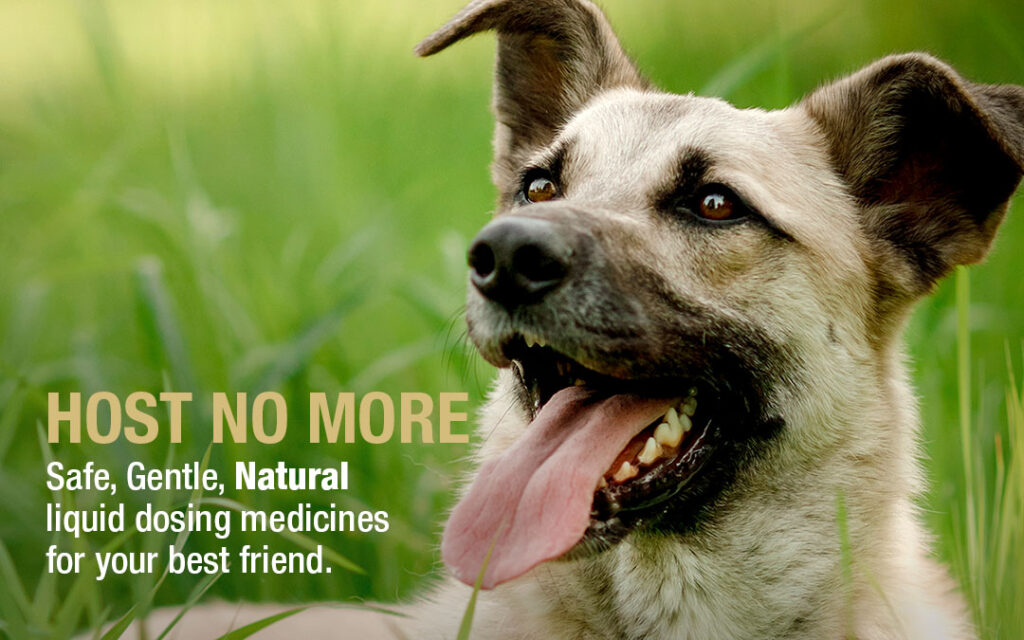

Pingback: Does your pet have worms? - HomeoPet